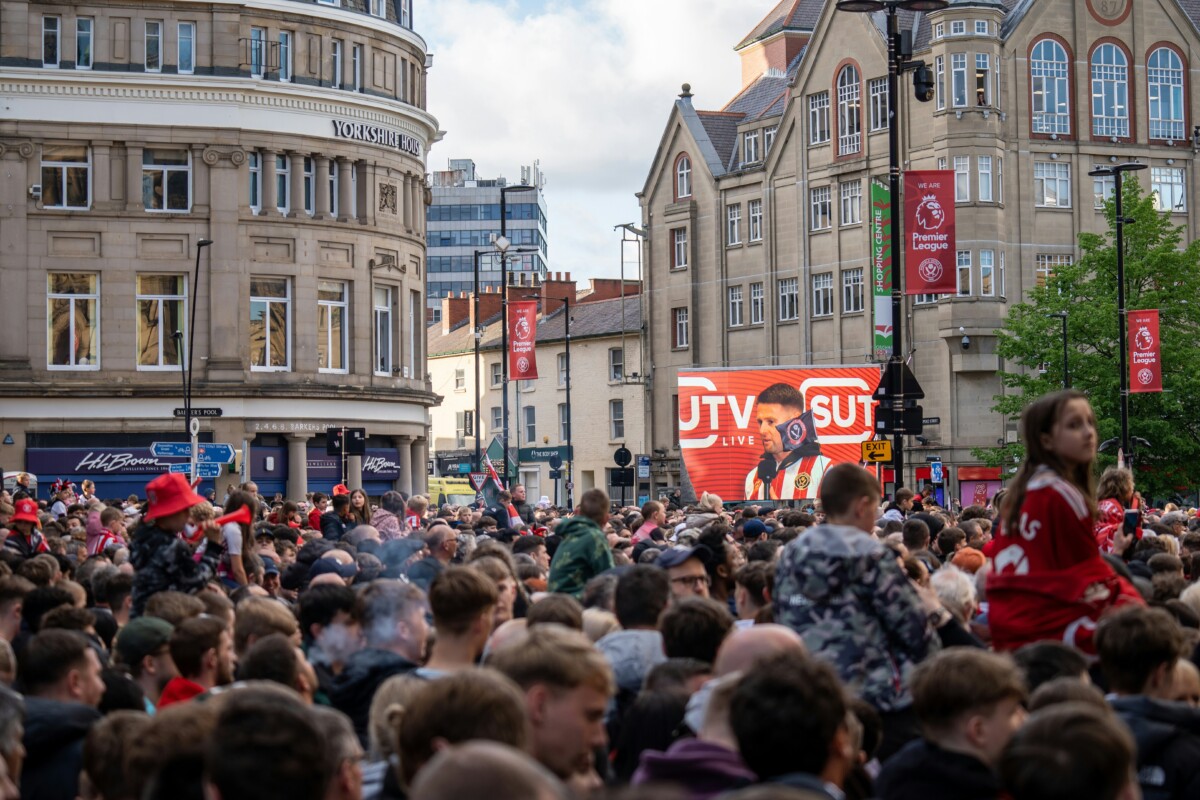Listen to the full podcast episode on YouTube, Spotify, and Apple Podcasts.
A Shift That Is Quiet but Serious
The conversation with sustainability strategist Jonathan Wragg takes place inside Bramall Lane in Sheffield. It is a calm setting for a discussion that affects thousands of small businesses. Jonathan has worked in sustainability roles across multiple industries for almost two decades, and he sees a pattern forming. Large organisations are asking harder questions about the suppliers they rely on, and they expect real answers.
He puts it plainly.
“By your business not being more sustainable, you are seen as a high risk supplier.”
For SMEs, this change arrives quickly. Many work with short planning cycles and tight margins. They see sustainability as something to improve when time allows. Their biggest customers see it as a decision point today.

A Career Built on Work, Chance and Values
Jonathan describes his route into sustainability as accidental. He joined the Royal Navy at sixteen and learned discipline, teamwork and a sense of duty.
“They give you a sense of doing the right thing when nobody is looking,” he says.
After leaving the Navy, he moved through plastics, packaging, manufacturing and global supply chains. His LinkedIn record shows senior roles in governance, supply-chain oversight and ESG development across more than forty countries.
Throughout this journey, he developed a skill that shapes his work today. He learned how to translate complex sustainability language into something people can understand.
“One of the things that I do best is the translation of sustainability,” he says.
This is the basis of his work with Ltt Group, the consultancy he co-founded to support SMEs.
The Turning Point That Changes Everything
Jonathan believes the era of vague sustainability claims is over. Small businesses once relied on broad statements in tenders and sales meetings. They are now challenged directly.
“If somebody tells me something, my response is prove it,” he says. “If you cannot, I am not going to buy off you.”
Corporate sustainability teams are now involved in procurement. They review carbon data. They check policies. They assess risk. They can see when language is used as decoration rather than substance.
Jonathan also points to the influence of investors. “Investment in ESG has gone up to around 19 trillion dollars globally,” he says.
“Politics works in three year cycles. Finance works in longer cycles.”
In other words, the pressure is structural. It will not disappear.
Helping SMEs Take Action Without Guesswork
Ltt Group works with SMEs by starting where the risk is most visible. “The first thing we do is work with the sales team,” Jonathan explains. “We identify the clients you have right now and what risk you have.”
If a single corporate buyer represents sixty percent of revenue, that is a direct vulnerability.
“If they stop using you, they will switch off the tap,” he says.
The support that follows is practical.
- A clear emissions baseline
- Honest policies and data
- Basic governance
- Social value reporting
- Straightforward language
- A timeline that can be tracked
Jonathan encourages SMEs to focus on accuracy rather than perfection. “It is about the journey you are on,” he says. “Be honest about where you are.”

The Moral and Commercial Tension
Jonathan speaks openly about a larger tension that sits behind this shift. Many SMEs feel overwhelmed. They face rising costs, labour shortages and daily operational challenges. Yet their customers are moving ahead with stronger sustainability expectations.
“Everybody just wants to grow,” he says. “The only way business can grow now is by being more sustainable.”
He also worries about the impact on communities if local suppliers fail to keep up.
“If businesses in Sheffield lose their big contracts, the unemployment impact is huge,” he says. “That terrifies me.”
This is the heart of his work. Sustainability is not only about targets. It is about livelihoods.
Why Procurement Will Shape the Future
Jonathan believes the next decade will be shaped more by procurement than by politics. He gives an example of a company that weighted a major tender ninety percent on CSR. Prices fell because suppliers understood the scoring and aligned to it. “It improved everything,” he says.
His own idea for faster progress is simple.
“Minimum sixty percent scoring on CSR with named accreditations,” he says. “Hold people to account.”
Clear expectations allow suppliers to plan, grow and compete on a level field.
The Takeaway
Jonathan’s message to SMEs is practical and direct. Waiting will not protect you. The market has moved, and it rewards those who can show what they are doing.
“By being more sustainable, you lower your risk. You protect your future,” he says.
Closing Reflection
The setting at Bramall Lane makes the conversation feel grounded in a real place and a real community. It is a reminder that responsible business is not a slogan. It shapes jobs, supply chains and the confidence of local regions.
For SMEs, sustainability is becoming a basic part of running a secure and resilient business. Proof has become a form of trust. And trust is now a condition for growth.
Sponsored by...
truMRK: Communications You Can Trust
👉 Learn how truMRK helps organisations strengthen the credibility of their communications.
Want to be a guest on our show?
Contact Us.
The Responsible Edge Podcast
Queensgate House
48 Queen Street
Exeter
Devon
EX4 3SR
Recognition.
Join 2,500+ professionals.
Exploring how to build trust, lead responsibly, and grow with integrity. Get the latest episodes and exclusive insights direct to your inbox.
© 2026. The Responsible Edge Podcast. All rights reserved.
The Responsible Edge Podcast® is a registered trademark.
Sponsored by truMRK
© 2026. The Responsible Edge Podcast

